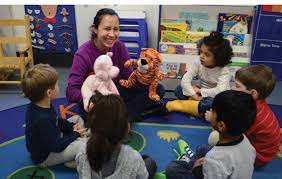Nursery school, often the first step in a child’s formal education journey, serves as more than just a learning environment. It plays a crucial role in fostering social development, helping young children build essential skills for interacting with their peers and the world around them. In this guide, we’ll explore how nursery school becomes a vibrant hub for a child’s social development and growth, providing a foundation for lifelong connections and communication.
1. Early Socialization: Building Friendships from the Start
Nursery school offers young children their first exposure to a social setting beyond the family. Through play, group activities, and shared experiences with friends, children begin to navigate social interactions, building the foundation for friendships. Learning to share toys, take turns, and cooperate in a group setting are early lessons that contribute to the development of crucial social skills.
2. Communication Skills: Verbal and Non-Verbal Expression
Interaction with peers and educators in nursery school facilitates the development of communication skills. Children learn to express themselves verbally, articulating thoughts, feelings, and needs. Additionally, non-verbal communication, such as body language and facial expressions, becomes a key aspect of social interaction in early years. Nursery school provides a supportive environment for children to practice and refine these essential communication tools.
3. Emotional Regulation: Understanding and Managing Feelings
Navigating social situations in nursery school helps children develop emotional regulation skills. They learn to identify and express their emotions, as well as understand the feelings of others. Educators play a crucial role in nursery environment in supporting children in managing emotions, fostering a positive and empathetic social environment that contributes to a child’s emotional intelligence.
4. Conflict Resolution: Learning to Navigate Disagreements
In a nursery school setting, children encounter various situations that may lead to disagreements or conflicts. Through guided support and positive feedback from educators, they learn valuable conflict resolution skills. These skills include expressing needs assertively, listening to others, and finding mutually agreeable solutions. Early exposure to conflict resolution sets the stage for healthy interpersonal relationships in the future.
5. Teamwork and Collaboration: Achieving Goals Together
Participating in group activities and projects at primary school encourages teamwork and collaboration. Nursery school provides opportunities for children to work together towards common goals, fostering a sense of camaraderie. These collaborative experiences teach children the importance of teamwork, collective effort, and the joy of achieving shared objectives.
6. Cultural Awareness: Embracing Diversity and Inclusion
Nursery school is a microcosm of most children with diverse backgrounds and experiences. Exposure to peers from different cultural, ethnic, and social backgrounds promotes cultural awareness and inclusivity. Children learn to appreciate diversity, develop open-mindedness, and embrace the richness of a multicultural world.
7. Independence and Responsibility: Taking Ownership of Actions
As children engage in daily routines and activities at nursery school, they gradually develop a sense of independence and responsibility for personal space. From tidying up after playtime to taking care of personal belongings, these tasks instil a sense of ownership and accountability. Learning to be responsible for oneself contributes to a child’s growing autonomy and self-confidence.
8. Social Play: The Heart of Social Development
Play is the language of childhood, and nursery school is a playground for social development. Whether engaged in imaginative play, collaborative games, or role-playing scenarios, a nursery helps children learn to navigate social dynamics, negotiate rules, and explore creative expression. Social play serves as a cornerstone for the development of social skills and provides a joyous avenue for learning.
Encourage Children
Encouragement is a transformative force that shapes the emotional, cognitive, and social development of children. Through positive reinforcement, effective communication, and fostering a growth mindset, adults can create an environment where children thrive. The power of encouragement lies not only in the external praise a child receives but in the internalized belief in their capabilities and worth.
Nurturing Emotional Development in Other Children
Emotional development is a profound and intricate journey that shapes a child’s capacity to understand, express, and manage their feelings. This essential aspect of a child’s development development lays the foundation for resilience, empathy, and healthy relationships.
Understanding Emotions: The Gateway to Emotional Intelligence
At the core of emotional development is the ability to understand and identify emotions. Children gradually learn to recognise their own feelings and those of others, paving the way for emotional intelligence. This awareness forms the basis for appropriate behaviour, effective communication, conflict resolution, and building meaningful connections throughout life.
Expressing Emotions: Fostering Healthy Outlets
Encouraging children to express their emotions in a healthy and constructive manner is a fundamental aspect of emotional development. Whether through verbal communication, artistic expression, or physical activities, providing diverse outlets allows children to navigate and communicate their feelings effectively. This expression not only supports their emotional health and well-being but also contributes to the development of effective coping mechanisms.
Emotional Regulation: Navigating the Rollercoaster
Emotional development equips children with the tools to regulate their emotions. From the highs of joy and excitement to the lows of frustration or sadness, learning to navigate this emotional rollercoaster is a crucial life skill. Parents and educators play a pivotal role in guiding children towards healthy coping strategies, helping them develop relationships with them understand and manage their emotions in various situations.
Empathy and Perspective-Taking: Building Compassionate Hearts
As emotional development progresses, children begin to develop empathy—a profound understanding of others’ feelings. This ability to step into someone else’s shoes and appreciate different perspectives is foundational for building positive relationships. Educators and parents can support children nurture empathy by encouraging acts of kindness, discussing emotions, and modelling compassionate behaviour.
Social Relationships: The Heart of Emotional Growth
Emotional development is intricately linked to the formation and maintenance of social relationships. Children learn valuable lessons in social emotional and about trust, communication, and cooperation through interactions with peers, siblings, and adults. Positive social experiences contribute significantly to emotional growth, fostering a sense of belonging and emotional security.
Resilience: Bouncing Back from Challenges
Resilience, the ability to bounce back from setbacks, is a key outcome of emotional development. Children who have developed emotional resilience are better equipped to cope with life’s challenges. Nurturing resilience involves acknowledging difficulties, providing support, and encouraging the child develop a positive mindset that views setbacks as opportunities for growth.Cultural and Self-Identity: Embracing Individuality
Emotional development plays a vital role in shaping a child’s cultural and self-identity. As children explore their own emotions more, they also begin to understand the cultural and personal factors that influence their feelings and behaviours. This self-awareness contributes to the development of a strong and positive sense of identity.
Social Skills
Social skills are the compass that guides individuals through the intricate landscapes of human interaction. For children, for example, mastering these skills is a crucial aspect of their development, laying the foundation for positive relationships, effective communication, and a strong sense of belonging.
Nursery school serves as a dynamic crucible for social development in young children. Beyond academics, it becomes a space where lifelong skills in communication, listening skills teamwork, emotional intelligence, and cultural understanding take root. By providing a supportive and enriching social environment, nursery school becomes a foundational stepping stone for a child’s holistic growth, preparing them for the social intricacies of the wider world.
FAQs:
- At what age should a child start nursery school for optimal social development?
- Many children start nursery school between the ages of 2 and 4. However, optimal timing can vary based on individual readiness and family preferences.
- How do nursery school educators support social development in young children?
- Educators play a pivotal role in fostering social development by creating a supportive and inclusive environment, guiding conflict resolution, facilitating group activities, and promoting positive communication.
- What are the long-term benefits of strong social development in early childhood?
- Strong social development in early childhood sets the stage for positive interpersonal relationships, effective communication, and emotional intelligence in later life. It contributes to overall well-being and success in various social contexts.
- How can parents reinforce social development at home?
- Parents can reinforce social development at home by encouraging playdates, providing opportunities for group activities, modelling positive communication, and nurturing empathy and emotional expression in their children.
- Is nursery school essential for social development, or can it be achieved through other means?
- While nursery school offers a structured environment for social development, children can also acquire social skills through playgroups, community activities, and interactions with siblings and extended family members. Nursery school provides a dedicated space for holistic development but is not the sole avenue for social growth.



Recent Comments